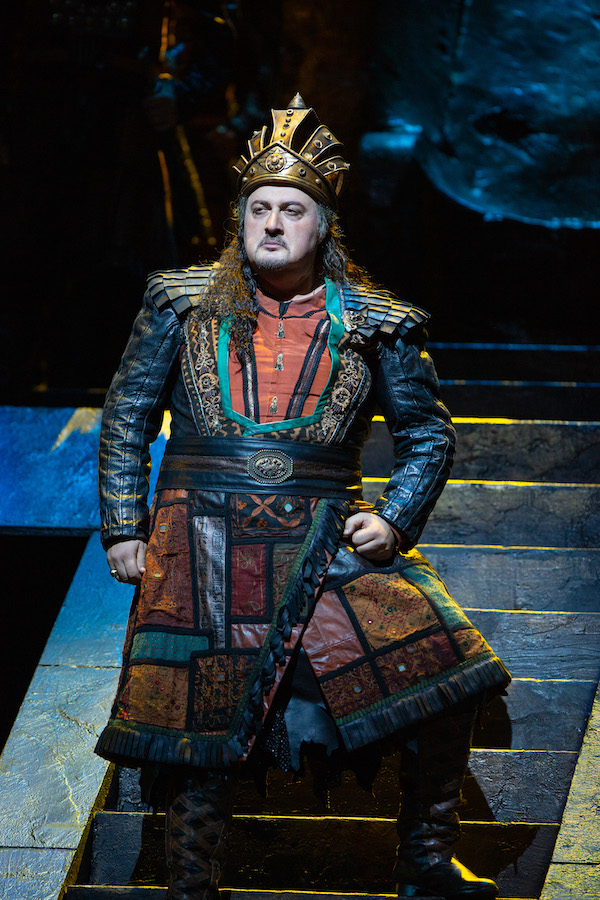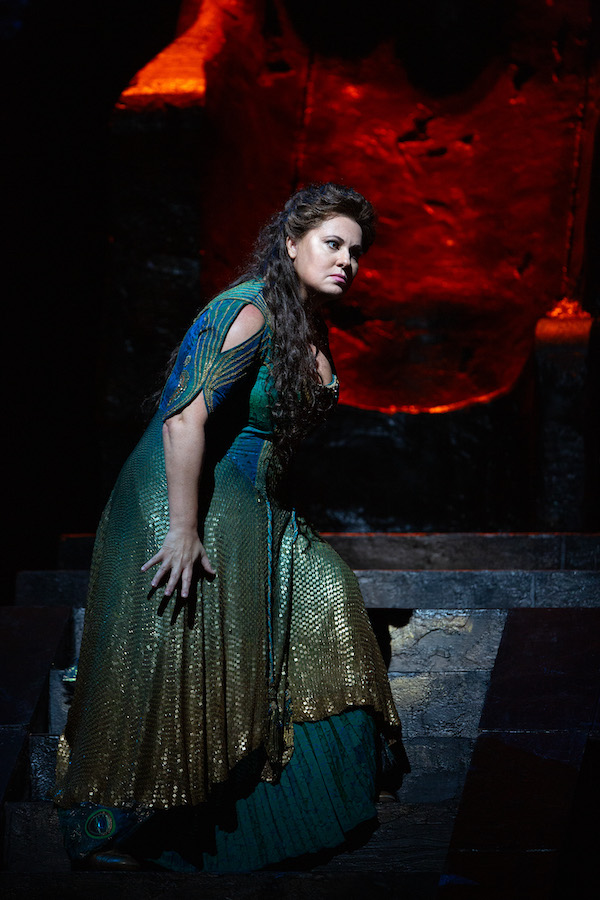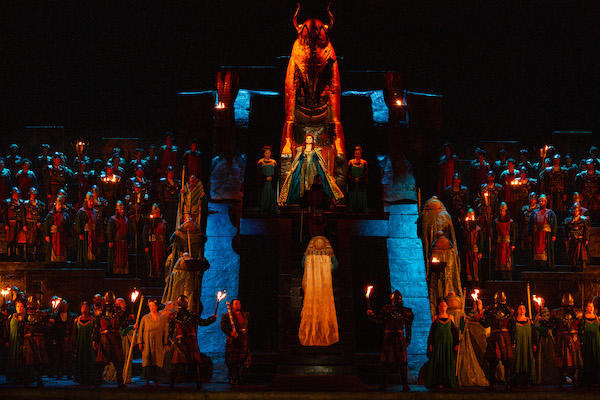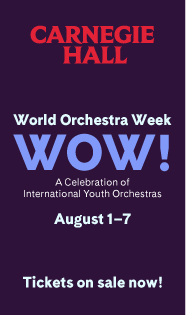“Nabucco” returns to Met, vocal thrills and spectacle intact

Verdi’s Nabucco returned to the Metropolitan Opera on Thursday in the late Elijah Moshinsky’s monumental production from 2001. The opera is an account of the Babylonian captivity after the fall of Jerusalem at the hands of Nebuchadnezzar (Nabucco). It was Verdi’s third opera and the one that made his career.
When it first premiered, Moshinsky’s concept had its detractors, but with time the production has become one of those classic Met stagings that combine historical accuracy and impressive stagecraft. The set was by John Napier, known for his many award-winning collaborations with Andrew Lloyd Webber. Musical theater making its presence felt in grand opera raised an eyebrow or two then, as it still does today.
Napier’s concept is straightforward with two massive, tiered structures placed back to back on the Met’s rotating stage. One side depicts Jerusalem and the other Babylon. The latter is constructed from massive sandstone-colored blocks, with an altar and library of scrolls in the center. To evoke ancient Babylon, a throne is set into a towering statue of the god Baal.
The Temple of the Jews goes up in flames and lightening strikes as Nabucco goes mad, but steep staircases are the most amazing aspect of Napier’s creation. The cast, especially the Abigaille, has to be fit to move about this set. It is, however, an ideal acoustical shell, especially conducive to enjoying the singing of the magnificent Met chorus. And Nabucco is full of terrific Verdi choruses, including the most famous of all, “Va, pensiero.”
In his house debut in the title role, George Gagnidze was a powerhouse, both physically and vocally. Vocally, he was in prime estate. The more bombastic moments were impressive, but equally so was his haunting singing in the mad scene and the other reflective passages Verdi composed for the Babylonian king.
The role of Abigaille, a slave presumed to be the king’s daughter, is a voice buster. Returning to the role at the Met, Liudmyla Monastyrska surmounts the role’s hurdles with reasonable ease. And as with Gagnidze, she was especially effective in the closing scene of the opera when all is lost and she commits suicide. The fierce warrior princess was gone, and a gentler woman emerged with a shimmering, beautiful voice to match. Met audiences don’t often get to hear Monastyrska in a role with this kind of range.
Dmitry Belosselskiy was also reprising the role of the high priest Zaccaria. His robust bass rang out fierce and defiant, although the lowest notes of his voice were inaudible. He was most convincing in the aria “Vieni, o Levita” in which Zaccaria reads over the Tablets of the Law.
Mezzo-soprano Maria Barakova was compelling as Fenena, Nabucco’s actual daughter. The richness and beauty of her voice was fully revealed in “O dischiuso è il firmamento,” where Fenena, having converted to Judaism, prepares to die as a martyr.
Tenor SeokJong Baek made his Met debut as Ismaele, an Israelite who is love with Fenena, but rebuffs Abigaille’s declarations of love. Baek came on stage like gangbusters, but settled quickly to reveal a vivid stage presence and gleaming tenor voice which carried easily into the house. Ismaele is a relatively small role, so hopefully this exciting young tenor will return soon in something more substantive.
The Met cast the supporting roles with care. The ever-dependable Scott Sully displayed his fine tenor as the Babylonian soldier Abdallo. Two participants in the Met’s Lindemann Young Artist Program, Brittany Olivia Logan as Anna and Le Bu as the High Priest of Baal, made their presence felt. Logan’s sumptuous soprano could be heard effortlessly floating above in the Act II ensemble when the Jews learn that they will all be executed at Abigaille’s command.
Verdi placed the chorus at the center of the action in Nabucco. “Va pensiero” garners all the attention and applause, but “Gli arredi festivi giù cadano infranti” which is heard at the beginning of the opera, and “Immenso Jehova,” sung by the Hebrew in Act 4 to thank God for saving His people, are equally grand. The Met chorus sang them all gloriously.
Conductor Daniele Callegari presided over all in the pit leading a fast-paced performance that bristled with energy. It was a treat to hear the Met orchestra play the well-known Overture with such brilliance. Revival director J. Knighten Smit indulged in no prefatory stage business to distract from the music, a temptation that few present-day directors can resist.
Nabucco continues through January 26. metopera.org



Posted Jan 07, 2024 at 9:08 am by Maxine Cupido
I loved this performance of Nabucco, and especially Calligari’s musical direction. He is brilliant! It was such a gift on a dreary January day in Ontario, Canada!!
Posted Jan 11, 2024 at 3:47 am by Esther
BRAVISSIMO TO ALL ! IT WAS A MAGNIFICENT PERFORMANCE !